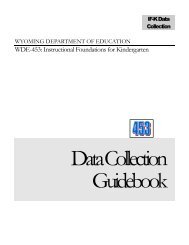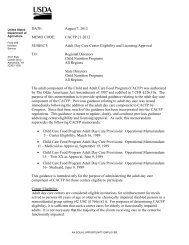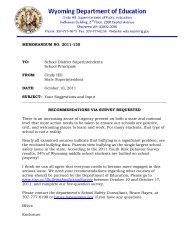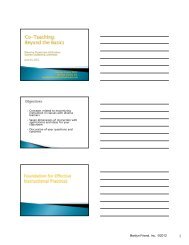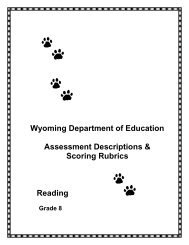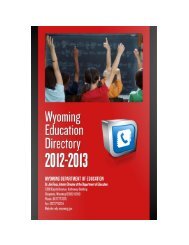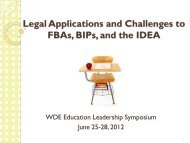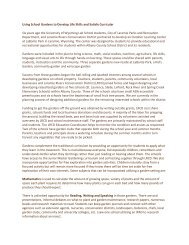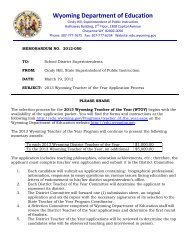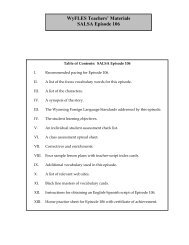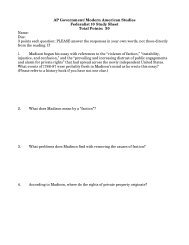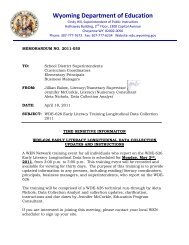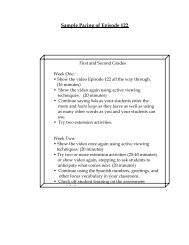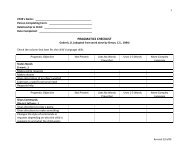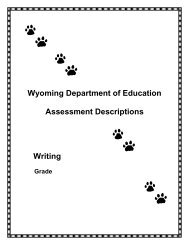2010 Conference Program - Wyoming Department of Education ...
2010 Conference Program - Wyoming Department of Education ...
2010 Conference Program - Wyoming Department of Education ...
Create successful ePaper yourself
Turn your PDF publications into a flip-book with our unique Google optimized e-Paper software.
<strong>Wyoming</strong> Kids First <strong>of</strong> the Wind River<br />
Reservation and the <strong>Wyoming</strong> <strong>Department</strong> <strong>of</strong><br />
<strong>Education</strong> would like to thank the following<br />
sponsors:<br />
Shoshone & Arapaho Head Start Birth to Five <strong>Program</strong><br />
Eastern Shoshone & Northern Arapaho Joint Business Council<br />
<strong>Wyoming</strong> Early Childhood Partnership<br />
John P. Ellbogen Foundation<br />
Wind River Casino<br />
Fremont County School District #1<br />
Fremont County School District #6<br />
Fremont County School District #21<br />
Fremont County School District # 25<br />
Fremont County School District #38<br />
St. Stephens Indian School<br />
Central <strong>Wyoming</strong> College<br />
We encourage everyone to give a special thank you to Fremont<br />
County School District #14 and the staff <strong>of</strong><br />
<strong>Wyoming</strong> Indian High School.<br />
CONFERENCES AT A GLANCE<br />
THURSDAY - AUGUST 26, <strong>2010</strong> at GREAT PLAINS HALL, ARAPAHOE<br />
8:00am Registration opens, Breakfast<br />
8:30am - 10:15am General Session<br />
10:30am - 12:00am Breakout Session I<br />
12:00pm - 1:15pm Lunch & Keynote Speaker<br />
1:30pm - 2:45pm Breakout Session II<br />
3:00pm - 4:30pm Breakout Session III<br />
FRIDAY - AUGUST 27, <strong>2010</strong><br />
8:00am - 12:00pm:!<br />
! Traveling Scavenger Hunt - Meet at GREAT PLAINS HALL, ARAPAHOE<br />
! ! ! ! (Buses will return to Hall at 2:30pm)<br />
First Aid Training - Meet at Frank Wise Business Plaza, FORT WASHAKIE<br />
12:00pm - 1:30pm General Session - Lunch & Cultural Sensitivity Roundtable Discussion<br />
! at Frank Wise Business Plaza, FORT WASHAKIE<br />
1:30pm Buses leave Frank Wise Plaza to return Scavenger Hunt participants to Arapahoe<br />
1:30pm - 4:00pm CPR Training at Frank Wise Business Plaza, FORT WASHAKIE<br />
4:00pm Registration begins for <strong>Wyoming</strong> Native American <strong>Education</strong> <strong>Conference</strong><br />
5:30pm - 7:00pm Welcoming Event & Honoring<br />
7:00pm - 9:00pm Social Pow Wow<br />
SATURDAY - AUGUST 28, <strong>2010</strong> at ETHETE, WYOMING INDIAN HIGH<br />
SCHOOL<br />
7:30 - 8:30am Registration with Continental Breakfast<br />
8:30am - 10:00am General Session<br />
10:15am - 11:45am Breakout Session I<br />
11:45pm - 1:00pm Lunch & Keynote Speaker<br />
1:15pm - 2:45pm Breakout Session II<br />
3:00pm - 4:30pm Breakout Session III<br />
4:30pm - 5:00pm Wrap Up / Evaluation
WELCOME TO THE WIND RIVER RESERVATION<br />
Early Childhood <strong>Conference</strong> <strong>2010</strong><br />
The Wind River Reservation Kids First Partnership is proud to sponsor its first<br />
yearly Reservation-based Early Childhood <strong>Conference</strong> to help highlight local<br />
resources for young children and their families. Another goal <strong>of</strong> the<br />
conference is to provide free training opportunities to parents, teachers,<br />
pr<strong>of</strong>essionals, and other interested community members.<br />
Who We Are<br />
<strong>Wyoming</strong> Kids First <strong>of</strong> the Wind River Reservation is a collaborative<br />
partnership through the Joint Business Council <strong>of</strong> the Eastern Shoshone and<br />
Northern Arapaho tribes. Agencies and organizations throughout the<br />
reservation community have come together to work on creating, developing,<br />
and maintaining the early childhood system within the Wind River Indian<br />
Reservation.<br />
This effort was made possible by a planning grant from the <strong>Wyoming</strong> Early<br />
Childhood Partnership with funds from WY Quality Counts, an initiative <strong>of</strong> the<br />
<strong>Wyoming</strong> <strong>Department</strong> <strong>of</strong> Workforce Services. Funding for the continued<br />
activities <strong>of</strong> <strong>Wyoming</strong> Kids First <strong>of</strong> the Wind River Reservation in <strong>2010</strong>-2011<br />
has been provided by the John P. Ellbogen Foundation.<br />
Our partnership commits to helping find, develop, and support resources to<br />
make this system as strong as it can be...because after all, itʼs for our<br />
children, and they are the future.<br />
We Believe...<br />
Early Childhood (ages 0-8) is the foundation for success in all four hills <strong>of</strong> life:<br />
childhood, youth, middle adulthood and elder.<br />
Family members are a childʼs first and most important teachers.<br />
<strong>Education</strong> for Native children should be culturally responsive.<br />
<strong>Education</strong> (including early education) is a tool <strong>of</strong> empowerment. When<br />
attained, education can never be taken away and is a path that will help our<br />
communities to continue to exist as distinct, unique tribal communities.<br />
Pr<strong>of</strong>essional development opportunities within the early childhood field are<br />
critical to providing a safe, healthy, developmentally appropriate and quality<br />
educational environment for children.<br />
Children are happy and in the best position to learn when they are healthy in<br />
all the spiritual, physical, dental, nutritional, and social/emotional areas.<br />
Early childhood is a workforce development issue, not just a family issue.<br />
Making an investment in children early on is like putting money away for the<br />
future.<br />
Preparing our children to be critical thinkers, decision-makers, and problemsolvers<br />
is building infrastructure for political leadership in our community.<br />
Thank You<br />
Thank you to all <strong>of</strong> our partners, especially those who served on the<br />
conference-planning committee, and to all <strong>of</strong> the businesses and agencies<br />
who donated items to be given away at the conference.<br />
Also, thank you to those with TRIAD, the <strong>Wyoming</strong> <strong>Department</strong> <strong>of</strong> <strong>Education</strong>,<br />
and the local school districts who were generously open to coordinating the<br />
Early Childhood and <strong>Wyoming</strong> Native American <strong>Education</strong> <strong>Conference</strong>s and<br />
taking the extra time to work together to make both conferences the best<br />
community events possible.
<strong>Conference</strong> Tribute<br />
Special thanks to the Shoshone & Arapaho Birth to Five Head Start program for<br />
donating the use <strong>of</strong> its facilities and other resources for the conference. Early on, the<br />
conference-planning committee wanted to dedicate the conference in loving memory <strong>of</strong><br />
past Shoshone & Arapaho Head Start Foster Grandmothers Margaret Spoonhunter<br />
and Mattie Meeks:<br />
The Foster Grandparent <strong>Program</strong> is an integral part <strong>of</strong> the Shoshone and<br />
Arapaho Birth-Five Head Start program. During the past twenty years more<br />
than 40 Grandparents have served as Foster Grandparents.<br />
Two <strong>of</strong> the exceptional Grandparents were Grandma Margaret Spoonhunter<br />
and Grandma Mattie Meeks, each <strong>of</strong> whom served almost twenty years in the<br />
S&A Head Start program.<br />
Both Grandma Margaret and Grandma Mattie were exceptional individuals,<br />
leading by example in word and by their actions. They each spoke their Native<br />
language and reinforced the language with the children when needed. Their<br />
experience and wisdom was much in demand by both staff and children as they<br />
were always present, on time and willing to assist where needed.<br />
Grandma Margaret and Grandma Mattie were the highlight <strong>of</strong> every conference<br />
they attended. The staff <strong>of</strong> other Head Start programs vied for the opportunity<br />
to have their pictures taken with them. Consequently, their pictures adorn the<br />
Head Start <strong>of</strong>fices and the homes <strong>of</strong> staff from Colorado to Alaska. Those Head<br />
Start programs were astonished at how involved these Foster Grandparents<br />
were and the respect that everyone gave them. Grandma Margaret and<br />
Grandma Mattie were very accommodating to anything associated with<br />
children. The exception was while attending a Head Start conference in<br />
Cheyenne when a high powered Native photographer had Grandma Margaret<br />
repeated poses for pictures and after what seemed like one hundred or more she<br />
looked at him and said “enough.” Grandma Mattie was a wonderful<br />
ambassador for Head Start, was always bubbling with energy and loved to talk<br />
about her classroom experiences. She served on several discussion panels while<br />
attending Head Start conferences. Grandma Mattie was the in-house supervisor<br />
for the program Foster Grandparent program for ten years.<br />
While both Grandma Margaret and Grandma Mattie are sorely missed we<br />
cannot help but give thanks for having known them and for the gift <strong>of</strong> their<br />
services to the Head Start program. They will always be fondly remembered in<br />
our hearts and in the hearts <strong>of</strong> the children <strong>of</strong> future generations.<br />
<strong>Conference</strong> Schedule<br />
Thursday, August 26<br />
8:00AM: REGISTRATION & BREAKFAST<br />
! at GREAT PLAINS HALL, ARAPAHOE<br />
8:30AM - 10:15AM: General Session GREAT PLAINS HALL<br />
! ! ! Welcome<br />
! ! ! Color Guard & Drum<br />
! ! ! Prayer<br />
! ! ! James St. Goddard - “Leadership and Economic<br />
! ! ! ! ! Development in Indian Country”<br />
! ! ! Early Childhood Address & Honoring<br />
! !<br />
10:30AM - 12:00PM: Breakout Session I<br />
! ! CLASSROOMS (HEAD START AND IMMERSION)<br />
12:00PM - 1:15PM: General Session - Lunch<br />
! ! Keynote Speaker: Dr. Eduardo Duran<br />
! ! GREAT PLAINS HALL<br />
1:30PM - 2:45PM: Breakout Session II<br />
! ! CLASSROOMS (HEAD START AND IMMERSION)<br />
3:00PM - 4:30PM: Breakout Session III<br />
! ! CLASSROOMS (HEAD START AND IMMERSION)
Friday, August 27<br />
Early Childhood <strong>Conference</strong> events are split this day. <strong>Conference</strong><br />
participants can choose to either sign up to go on the Traveling<br />
Scavenger Hunt or to sign up to attend free First Aid and CPR<br />
Trainings. Both groups will participate in Cultural Sensitivity<br />
Roundtable Lunch. Events transition to the <strong>Wyoming</strong> Native <strong>Education</strong><br />
<strong>Conference</strong> at 4:00pm.<br />
8:00AM - 12:00PM:<br />
!<br />
! Traveling Scavenger Hunt - at RESERVATION COMMUNITIES<br />
Participants will meet in front <strong>of</strong> Great Plains Hall in Arapahoe at 8:00am.<br />
Complimentary light breakfast provided. Buses will leave at 9:00am, visit sites in the<br />
Arapahoe, Ethete, and Fort Washakie areas and end at the new Frank Wise Business<br />
Plaza across from Hines Trading Post in Fort Washakie for lunch and a roundtable<br />
discussion on Cultural Sensitivity. Participants who take the buses will be returned to<br />
Great Plains Hall at approximately 2:30pm.<br />
! First Aid Training - at FRANK WISE PLAZA, FORT WASHAKIE<br />
Participants will meet at Frank Wise Business Plaza in Fort Washakie at 8:00am and<br />
begin First Aid training.<br />
12:00PM - 1:30PM: General Session - Lunch & Cultural Sensitivity<br />
! Roundtable Discussion at FRANK WISE PLAZA, FORT WASHAKIE<br />
1:30PM - 4:00PM: CPR Training at FRANK WISE PLAZA, FORT WASHAKIE<br />
! Training will begin at Frank Wise Business Plaza in Fort Washakie at 1:30pm following<br />
! the Cultural Sensitivity Roundtable Lunch.<br />
4:00PM: REGISTRATION OPENS<br />
! <strong>Wyoming</strong> Native <strong>Education</strong> <strong>Conference</strong><br />
! at WYOMING INDIAN HIGH SCHOOL, ETHETE<br />
BREAKOUT SESSION DESCRIPTIONS<br />
Early Childhood <strong>Conference</strong><br />
Voices <strong>of</strong> the Heart Film Screening & Language Revitalization<br />
FACILITATOR: GAIL RIDGELY<br />
The film Voices <strong>of</strong> the Heart looks at the new Arapaho native immersion school on the<br />
Wind River Reservation in <strong>Wyoming</strong> through the eyes <strong>of</strong> Tish Keahna, a Meskwaki/<br />
Ojibwe mother, who returns to Wind River after thirty years to see how education and<br />
growing up on the "rez" have changed. Now a mother <strong>of</strong> three children who is living a<br />
world away in Maine, Tish is curious to revisit her childhood through this new school<br />
and examine the broader issues <strong>of</strong> immersion language education that is catching on<br />
throughout many indigenous communities in the U.S. and throughout the world. A<br />
community discussion on current language revitalization efforts within the Wind River<br />
Indian Reservation will follow the film screening.<br />
IEP Presentation - Protection and Advocacy System, Inc.<br />
PRESENTERS: RANDY PEIL AND DICK LEFEVRE, Protection &<br />
Advocacy System, Inc.<br />
Protection & Advocacy System, Inc. will present an overview <strong>of</strong> its programs. Also<br />
presented will be a powerpoint presentation about the Individual <strong>Education</strong> <strong>Program</strong><br />
(IEP) which will cover IEP team members, pre-meeting considerations, eligibility, annual<br />
goals, Extended School Year (ESY), and other topics related to the IEPʼs.<br />
What Should My Baby Be Doing? Behavioral Stages, ages 0-5<br />
PRESENTER: KIMBERLY HEARN, LPC, Early Intervention <strong>Program</strong><br />
Social emotional behavioral development expectations will be discussed in conjunction<br />
with typical developmental states in the life <strong>of</strong> the young child. Specific information for<br />
parents about what the infant, toddler and preschooler typically will be doing at these<br />
different stages and how the family can participate and enjoy this time in the childʼs life.<br />
Grandparents Raising Grandchildren<br />
PANEL DISCUSSION<br />
<strong>Wyoming</strong> is one <strong>of</strong> the states leading the nation in numbers <strong>of</strong> grandparents raising<br />
grandchildren. A group <strong>of</strong> Wind River Reservation grandparents will help lead a<br />
discussion on the experiences <strong>of</strong> grandparents raising grandchildren. They will speak<br />
on some <strong>of</strong> the joys and challenges and how schools and other programs can help<br />
support grandparents raising their grandchildren.<br />
Curriculum Development<br />
PRESENTERS: VERONICA MILLER & VONDA WELLS, PH.D<br />
Curriculum is the roadmap to your success as a teacher. Your curriculum directs and<br />
guides the learning taking place in your classroom. In this session, we will discuss<br />
standards, priorities, Native language and the roles they play in developing a curriculum<br />
that is tailored to your specific needs.
Early Childhood <strong>Program</strong> Management<br />
PRESENTER: JOSEPH HENRY, ED.D., Shoshone & Arapaho Head Start<br />
Birth to Five <strong>Program</strong><br />
A discussion <strong>of</strong> the elements needed for a successful program: the vision/mission for<br />
the program; a strategic plan to achieve that vision/mission; the goals and objectives for<br />
short and long range planning; hiring the right staff; background checks on all staff;<br />
educational requirements/certifications; a staff development plan for each staff member;<br />
fiscal accountability on-going not only reflected annually in the audit; required reports on<br />
time; program policies and procedures that include a drug and alcohol testing policy;<br />
and implementation <strong>of</strong> these on a daily basis. Also discussed will be the need for a<br />
program to have an evaluation process or a results-oriented assessment at least<br />
annually.<br />
American Indian Women in Higher <strong>Education</strong><br />
PRESENTER: LORINDA LINDLEY, PH.D<br />
Lorinda Lindley will present an overview <strong>of</strong> historical perspectives <strong>of</strong> American Indian<br />
women, some discussion <strong>of</strong> values and practices <strong>of</strong> contemporary American Indian<br />
women, data pertaining to American Indian womenʼs participation in higher education,<br />
and findings from her qualitative study with Northern Arapaho women who earned<br />
degrees at the University <strong>of</strong> <strong>Wyoming</strong>.<br />
Baby/Infant Nutrition - Feeding With Love and Good Sense: Parts<br />
I & II<br />
GLEN REVERE, Indian Health Service<br />
Children are real people with feelings and capabilities. This series is a very practical,<br />
interactive workshop designed to help caregivers with real questions. The roots <strong>of</strong><br />
childhood obesity <strong>of</strong>ten start during the first year <strong>of</strong> life. This series utilizes both video<br />
and discussion to explore the challenging world <strong>of</strong> positively feeding young children to<br />
teach them how to feed themselves for a lifetime. This first session explores breast and<br />
bottle feeding for infants and how to transition to solid foods for the older baby. Specific<br />
recommendations and examples abound for feeding baby during this most important<br />
beginning year <strong>of</strong> life. Common challenges are addressed.<br />
Tips for Reading with My Child<br />
PRESENTER: SHIRLEY MONDRAGON, Shoshone & Arapaho Head Start<br />
Birth to Five <strong>Program</strong><br />
In this hands-on workshop, Shirley Mondragon will give participants information about<br />
how to choose good books for reading with your children, book suggestions, and a<br />
discussion <strong>of</strong> interactive techniques to do when reading with children to make reading<br />
more fun and exciting. Free childrenʼs books will be distributed to workshop<br />
participants.<br />
“Families <strong>of</strong> Tradition” and “The Good Road <strong>of</strong> Life”<br />
PRESENTERS: KAIT HIRCHAK, LʼDAWN OLSEN, BLANCHE FRIDAY,<br />
PH.D, AND RAIN CHIPPEWA<br />
“Families <strong>of</strong> Tradition” brings families together through the talking circle, Medicine<br />
Wheel Teachings, Four Laws <strong>of</strong> Change and the Healing Forest. Through class<br />
activities, families gain the tools to empower themselves while strengthening trust,<br />
communication, and healthy relationships within their families.<br />
“The Good Road <strong>of</strong> Life” focuses on Native menʼs wellness through traditional values<br />
and ceremony. Issues that are addressed include: incarceration, addiction, anger<br />
management, fatherhood, healthy relationships, and much more.<br />
Classroom Design<br />
PRESENTER: VONDA WELLS, PH.D<br />
Setting up your classroom is one <strong>of</strong> the most important steps for a successful year as a<br />
teacher. In this workshop, we will discuss intentionality, some basic rules, tricks and<br />
ideas to help you manage and create an environment that is engaging and structured<br />
for the children in your classroom. It is important to keep in mind classroom teachers<br />
are the most important elements in a preschool classroom.<br />
Fiscal Accountability<br />
PRESENTER: NADINE MEEKS, Shoshone & Arapaho Head Start Birth to<br />
Five <strong>Program</strong><br />
An example accounting manual with policies and procedures will be presented. There<br />
will be a discussion on how to work with auditors, tools to use, and other resources<br />
available to help achieve fiscal accountability.<br />
Sand Creek Massacre Dedication as National Historic Site<br />
PRESENTERS: GAIL RIDGELY & BEN RIDGLEY<br />
Gail Ridgely and Ben Ridgley will present their research and experience on the Sand<br />
Creek Massacre, an event that continues to be an important remembrance in the<br />
histories <strong>of</strong> the Arapaho and Cheyenne tribes. On April 28, 2007 a dedication <strong>of</strong> the<br />
Sand Creek Massacre as a National Historical Site was held in Kiowa County,<br />
Colorado. Gail Ridgely will share stories and documentation <strong>of</strong> the Northern Arapaho<br />
tribal members and youth who traveled to attend the dedication event.<br />
Toddler/Preschool Nutrition - Feeding With Love and Good<br />
Sense: Parts III & IV<br />
GLEN REVERE, Indian Health Service<br />
This second half <strong>of</strong> the series delves deeper into developing a good eater and the idea<br />
<strong>of</strong> division <strong>of</strong> responsibility during meal times. The toddler starts to find out about his<br />
world and to develop a mind <strong>of</strong> his own. Food battles and jags occur – “short-order<br />
cooks” are <strong>of</strong>ten made. Nutrient needs change and food safety becomes an issue. The<br />
preschooler wants to get better at eating and desires to please you. The video/<br />
discussion format is continued as this series concludes its presentation <strong>of</strong> the<br />
challenging world <strong>of</strong> early childhood nutrition.
Disciplining with Kindness<br />
PRESENTERS: NORTHERN ARAPAHO TRIBAL HEALTH PROGRAM<br />
Representatives <strong>of</strong> the Northern Arapaho Tribal Health <strong>Program</strong>s will present their<br />
perspectives on how to discipline with kindness and talk about their experiences as<br />
parents and grandparents. An overview <strong>of</strong> the services Northern Arapaho Tribal Health<br />
<strong>Program</strong>s <strong>of</strong>fer will also be presented.<br />
Wind River Tribal Youth <strong>Program</strong><br />
PANEL DISCUSSION<br />
Representatives <strong>of</strong> the Wind River Tribal Youth <strong>Program</strong> at St. Michaelʼs in Ethete will<br />
talk about the program and activities it sponsors, their experiences, and approaches to<br />
help Wind River Reservation youth deal with many <strong>of</strong> the issues facing them today.<br />
Healing the Effects <strong>of</strong> Historical Trauma: A New Approach Based<br />
on Ancient Teachings<br />
EDUARDO DURAN, PH.D<br />
In this presentation Dr. Duran will discuss how historical trauma impacts some <strong>of</strong> the<br />
symptoms that we deal with on a daily basis. By changing the way we diagnose and<br />
understand addictions and other chronic health problems we can gain understanding<br />
towards healing and preventing these symptoms in the future.<br />
Head Start - Blazing the Early Childhood <strong>Education</strong> Trail<br />
PRESENTER: STEPHANIE SALAZAR-RODRIGUEZ, BA, MNM<br />
Come explore the genesis <strong>of</strong> Head Start and their role in establishing quality Early<br />
Childhood <strong>Education</strong> programs. This will be followed by identifying risk factors related<br />
to the achievement gap and the importance <strong>of</strong> collecting and reporting assessment<br />
data.<br />
WELCOME TO THE<br />
<strong>Wyoming</strong> Native American <strong>Education</strong> <strong>Conference</strong><br />
The <strong>Wyoming</strong> Native American <strong>Education</strong> <strong>Conference</strong> <strong>2010</strong> is<br />
sponsored by the <strong>Wyoming</strong> <strong>Department</strong> <strong>of</strong> <strong>Education</strong> and the<br />
State Personnel Development Grant.<br />
The conference-planning committee hopes that<br />
conference participants will:<br />
1. Increase their awareness <strong>of</strong> issues and<br />
concerns about <strong>Wyoming</strong> Native American<br />
students’ attendance and enrollment<br />
2. Increase their knowledge and understanding <strong>of</strong><br />
different agencies’ processes related to students<br />
from the Wind River Indian Reservation.<br />
3. Increase their knowledge <strong>of</strong> how the staff <strong>of</strong><br />
each agency contributes to the health,<br />
education, and well-being <strong>of</strong> students<br />
4. Learn strategies on how best to meet the<br />
instructional and learning supports needs <strong>of</strong><br />
<strong>Wyoming</strong> Native American Students
Friday , August 27<br />
4:00PM: REGISTRATION OPENS<br />
! <strong>Wyoming</strong> Native <strong>Education</strong> <strong>Conference</strong><br />
! at WYOMING INDIAN HIGH SCHOOL, ETHETE<br />
5:30PM - 7:00PM: Reception Dinner & Honoring<br />
! at WYOMING INDIAN HIGH SCHOOL<br />
7:00PM - 9:00PM: Social Pow-wow<br />
! at WYOMING INDIAN HIGH SCHOOL GYM<br />
Saturday , August 28<br />
7:30AM - 8:30AM: Registration<br />
! at WYOMING INDIAN HIGH SCHOOL FOYER<br />
8:30AM - 10:00AM: General Session - Welcome<br />
! at WIHS GYM<br />
10:15AM - 11:45AM: Breakout Session I<br />
! at WIHS CLASSROOMS<br />
11:45AM - 1:00PM: Lunch & Keynote Speaker<br />
! at WIHS FOYER<br />
1:15PM - 2:45PM: Breakout Session II<br />
! at WIHS CLASSROOMS<br />
3:00PM - 4:30PM: Breakout Session III<br />
! at WIHS CLASSROOMS<br />
4:30PM - 5:00PM: Wrap Up / Evaluation<br />
GENERAL SESSION DESCRIPTIONS<br />
<strong>Wyoming</strong> Native <strong>Education</strong> <strong>Conference</strong><br />
! Dr. Dawn Mackety<br />
KEYNOTE SPEAKER - (MORNING SESSION)<br />
Approximately one out <strong>of</strong> every three American Indian students in <strong>Wyoming</strong> does not<br />
graduate from high school, a statistic that is <strong>of</strong>ten the result <strong>of</strong> a variety <strong>of</strong> factors. Dr.<br />
Dawn Mackety will discuss factors related to American Indian student dropout including<br />
indicators, absenteeism, mobility, and family engagement, as well as protective factors<br />
and resilience strategies that encourage American Indian students to stay in school.<br />
! Dr. Sandra Harwell<br />
! KEYNOTE SPEAKER - (LUNCH SESSION)<br />
“Rigor, Relevance, and Relationships: Keys to Student Success and<br />
Engagement”<br />
Native American students have learning needs unique to their culture, but also unique<br />
to their generation. Critical to meeting these learning needs are improved Rigor <strong>of</strong><br />
academic content, increased Relevance through work-based and cultural learning<br />
strategies, and improved Relationships among teachers/students/counselors/business/<br />
community/ parents. In order to help students find success as adults in a world that is<br />
dependent on a global economy, all stakeholders will need to work together to merge<br />
critical content and focus on the unique learning needs <strong>of</strong> a Native American Millennial<br />
Generation. This address will describe identified strategies consistent with improved<br />
student success through engagement-based teaching and learning.
BREAKOUT SESSION DESCRIPTIONS<br />
<strong>Wyoming</strong> Native <strong>Education</strong> <strong>Conference</strong><br />
!<br />
Tribal Courts/Tribal Prosecutorʼs Office/Truancy Officer<br />
PANEL DISCUSSION<br />
Panelists include Shoshone and Arapaho Tribal Court Chief Judge John St Clair,<br />
Shoshone and Arapaho Tribal Prosecutorʼs Office representative Carole Justice, and<br />
Wind River Tribal Youth <strong>Program</strong> Truancy Officer John Whitefeather. The panel will<br />
discuss the process <strong>of</strong> receiving referrals for schools for non attendance through court<br />
appearances, penalties for truancy, options for students and parents. Facilitated by Joe<br />
Simpson, Deputy State Superintendent <strong>of</strong> Public Instruction.<br />
Parental Involvement<br />
PRESENTER: DR. DAWN MACKETY<br />
Using focus groups <strong>of</strong> American Indian parents, this study examined parentsʼ<br />
involvement in their childrenʼs education including how they are involved, why they<br />
became involved, and factors that encourage and discourage involvement. While not<br />
unlike parent involvement in the general population, Indian parent involvement differs.<br />
Historical policies, educational experiences, and cultural issues make many aspects <strong>of</strong><br />
Indian parent involvement unique.<br />
Bridges Out <strong>of</strong> Poverty<br />
PRESENTER: PENNY BUSINGA<br />
How does poverty impact learning, work habits, or decision making? The reality <strong>of</strong><br />
living in poverty brings out a survival mentality and turns attention away from<br />
opportunities taken for granted by people in the middle and upper class. If you work<br />
with people in poverty, better understanding <strong>of</strong> how different their world is from yours<br />
will be invaluable. Most teachers today come from middle class backgrounds. In an<br />
educational setting, economic class differences create conflict and challenges for both<br />
teachers and students alike. Based on the work <strong>of</strong> Ruby Payne, we will explore:<br />
Impact <strong>of</strong> economic class differences on communication, interactions, and expectations;<br />
Symptoms <strong>of</strong> generational poverty and how they differ from situational poverty; Poverty-<br />
related behaviors and mindsets that affect learning; identification <strong>of</strong> the resources and<br />
strengths <strong>of</strong> any student; Tips, tools, and intervention strategies proven to increase your<br />
effectiveness; and “hidden rules” or social cues that differ greatly between the classes.<br />
Facilitated by Joy Mockleman, <strong>Wyoming</strong> <strong>Department</strong> <strong>of</strong> <strong>Education</strong>.<br />
Engaging Native Parents<br />
PRESENTER: ROBIN BUTTERFIELD<br />
Working with Native Parents: What Does It Take To Get Engagement?<br />
This interactive session will explore strategies to get Native parents engaged with the<br />
work <strong>of</strong> their students in school. Participants will be involved in activities which create<br />
an enjoyable climate for parents so that they can become more supportive <strong>of</strong> their<br />
studentʼs learning.<br />
District Culture & Curriculum<br />
PANEL DISCUSSION<br />
The panel will be lead by Marty Conrad, Fremont District #1, Lander, Dodie White,<br />
Fremont District #14 and Gloria St Clair, Fremont District # 21 sharing experiences<br />
trying to incorporate culture in the regular classroom. Panel will also discuss the effort<br />
to include accurate historical information from the Eastern Shoshone and Northern<br />
Arapaho tribes into the <strong>Wyoming</strong> State Social Studies standards. Lisa McCart, Fremont<br />
District #1, Lander will facilitate.<br />
Young Ladies Society<br />
PANEL DISCUSSION<br />
The Young Ladies Society is a vision inspired to provide empowerment to fight against<br />
the forces or pressures in our society that place young ladies at risk. The Young Ladies<br />
Society mission is strengthening, empowering and enlightening the body, mind and soul<br />
through active participation with the Young Ladies Society. The seed is planted and<br />
membership will help the organization to grow and fulfill the purpose and designs that<br />
members are inspired to address. This organization is community-wide and does not<br />
discriminate.<br />
Fort McDowell Tribal Initiatives<br />
PRESENTER: GARY LOUTZENHEISER<br />
Gary Loutzenheiser, <strong>Education</strong> Division Director for the Fort McDowell Yavapai Nation,<br />
presents “A Comprehensive Approach to Higher Graduation Rates.” Fort McDowell<br />
increased the GED-high school graduation rate from 46% to 90% in four years and has<br />
maintained an average 85% rate for the last four years. The program is comprehensive<br />
from birth to high school graduation. Gary has been an administrator in Arizona for the<br />
last 32 years, working with K-12 public school systems, the past 8 years at Fort<br />
McDowell.
AYP - Federal Update<br />
PRESENTER: HELEN LITTLEJOHN<br />
This session will give an overview <strong>of</strong> the U.S. <strong>Department</strong> <strong>of</strong> <strong>Education</strong> proposal for<br />
reauthorizing the Elementary and Secondary <strong>Education</strong> Act (NCLB). Additionally, the<br />
session will provide updates on U.S. <strong>Department</strong> <strong>of</strong> <strong>Education</strong> initiatives, including grant<br />
opportunities and supports available for American Indian students, educators and<br />
communities. Helen Littejohn is the Senior Public Affairs Representative for the U.S.<br />
<strong>Department</strong> <strong>of</strong> <strong>Education</strong> for fourteen western states.<br />
Teachers <strong>of</strong> American Indian Children<br />
PRESENTER: DR. ANGELA M. JAIME, University <strong>of</strong> <strong>Wyoming</strong><br />
The Teachers <strong>of</strong> American Indian Children Certificate graduate program <strong>of</strong> the<br />
University <strong>of</strong> <strong>Wyoming</strong> certifies that those who complete its five specialized courses<br />
possess the attitudes, knowledge, and competence necessary to effectively teach<br />
American Indian Children. Upon completion, students receive <strong>of</strong>ficial recognition <strong>of</strong><br />
their achievement on their University <strong>of</strong> <strong>Wyoming</strong> transcripts and an <strong>of</strong>ficial certificate.<br />
An overview <strong>of</strong> the history <strong>of</strong> the program, the program itself, and the future <strong>of</strong> the<br />
program will be presented in this session. Dr. Angela M. Jaime is an enrolled member<br />
<strong>of</strong> the Pit River and Valley Maidu <strong>of</strong> Northern California. Dr. Jaime joined the University<br />
<strong>of</strong> <strong>Wyoming</strong> College <strong>of</strong> <strong>Education</strong> in fall 2004, where she specializes in American Indian<br />
education, the study <strong>of</strong> Native women and their experiences in higher education,<br />
multicultural education, social justice, decolonization, critical race theory, and Womenʼs<br />
Studies.<br />
Native Learning Styles<br />
PRESENTER: VONDA WELLS, PH.D<br />
What is a learning style? According to Appleton (1983) a learning style is “the method<br />
by which one comes to know or understand the world. It is the accustomed pattern used<br />
to acquire information, concepts, and skills.” This workshop will explore some learning<br />
styles shared by many Native American students. It is important to keep in mind there<br />
are more than 500 tribal groups in the United States and that each Native American<br />
student must be treated as a unique and distinct individual.<br />
College Student Panel<br />
PANEL DISCUSSION<br />
This panel will include traditional and nontraditional students from Wind River. They will<br />
share stories <strong>of</strong> how they made it to college, successes and challenges. Sergio<br />
Maldonado, Diversity Coordinator / Instructor, Arts & Sciences Central <strong>Wyoming</strong><br />
College will facilitate.<br />
Impact Aid & School Finance<br />
PANEL DISCUSSION<br />
Representatives from districts will discuss Impact Aid federal funds, including what they<br />
are, how they can be used and who is eligible to receive them. Other topics will include<br />
school finance, other State and Federal monies, what it costs to run a school and other<br />
issues related to funding and budgets. This is an opportunity to learn what money is<br />
coming in to your district and how it is being used. Facilitated by Dianne Frazer,<br />
<strong>Wyoming</strong> <strong>Department</strong> <strong>of</strong> <strong>Education</strong>.<br />
Parental Involvement & Advocacy Panel<br />
PANEL DISCUSSION<br />
! What does successful parent involvement look like? This mixed panel !<strong>of</strong> local parents,<br />
! educators, and school representatives will discuss !topics such as what parents,<br />
! teachers, and schools can to to help children be successful, what schools can do to<br />
! make parents and other family members feel more welcome, and tips for parents to<br />
! become strong advocates for their childrenʼs education.<br />
Job Corps Informational Session<br />
PRESENTER: SANDY BARTON<br />
The new Wind River Job Corps is anticipated to be open in January <strong>of</strong> 2011 located in<br />
Riverton, WY This workshop will discuss Job Corps as the nationʼs largest residential<br />
and vocational training program for economically disadvantaged youth. Job corps has<br />
guided nearly 2 million young people between 16-24 years <strong>of</strong> age away from lives filled<br />
with poverty and unemployment, crime and welfare and steer them toward brighter<br />
futures filled with self-confidence, independence, and productive employment. The fulltime,<br />
year-round residential program <strong>of</strong>fers vocational training, education, housing,<br />
meals, medical care and counseling. Currently Ms. Barton is the Executive Director for<br />
the Fremont County Board <strong>of</strong> Cooperative <strong>Education</strong> Services (BOCES). She has been<br />
instrumental in implementing many programs and opportunities through Fremont<br />
County and the State <strong>of</strong> <strong>Wyoming</strong>, including the successful $40 million application for a<br />
<strong>Wyoming</strong> Job Corps.<br />
School Readiness Panel<br />
PANEL DISCUSSION<br />
There are a variety <strong>of</strong> perspectives on what makes a child happy, healthy, and ready for<br />
school. This mixed panel <strong>of</strong> school district, <strong>Wyoming</strong> <strong>Department</strong> <strong>of</strong> <strong>Education</strong>, Head<br />
Start, and other agency representatives will discuss school readiness standards and<br />
how diverse groups can work together and collaborate to help all children succeed in<br />
school and life.
SELECTED PRESENTERS- Early Childhood <strong>Conference</strong><br />
Gail Ridgely & Ben Ridgley<br />
Gail Ridgely is an enrolled member <strong>of</strong> the Northern Arapaho Tribe and direct descendent <strong>of</strong> Lame Man, a<br />
survivor <strong>of</strong> the Sand Creek Massacre. He and other members <strong>of</strong> the Ridgely family have been strongly involved<br />
in educating about the event, working to designate the massacre site as a National Historic Site and organizing<br />
past Sand Creek Massacre runs in memory <strong>of</strong> the Arapaho ancestors who were brutally murdered there and to<br />
honor those who survived.<br />
The late Eugene Ridgely, Sr. through oral history was encouraged by his relatives to paint the story <strong>of</strong> the Sand<br />
Creek Massacre in 1993 on an elk hide. Presently the hide is on display at the Buffalo Bill Historical Plains<br />
Museum.<br />
Ben Ridgley was instrumental in working with the State <strong>of</strong> <strong>Wyoming</strong> and local legislators in establishing the<br />
Sand Creek Trail WYDOT markers. Eighty highway markers start the Colorado and <strong>Wyoming</strong> border just south<br />
<strong>of</strong> Cheyenne.<br />
Glen Revere<br />
Glen Revere is a Captain with the U.S. Public Health Service Commissioned Corps. He has been detailed to the<br />
Indian Health Service as a Nutritionist for 18-years and has served 9-Tribes on 7-Reservations in 3-states<br />
during his tour <strong>of</strong> duty. He holds a B.A. in biology and a M.S. in Nutrition/Food Science from California State<br />
University, Northridge and has several specialty certifications including diabetes care, medical disaster<br />
response, and environmental health. He is currently the Public Health Nutritionist at the Wind River Reservation<br />
in <strong>Wyoming</strong>. He absolutely loves fly fishing.<br />
Vonda Wells, Ph.D. - Northern Arapaho/Blackfeet<br />
Dr. Wells has been involved with Early Childhood <strong>Education</strong> for 18 years as a parent, teacher, center director,<br />
education manager, trainer and finally as a National Head Start fellow (2002/2003). Dr. Wells is a private<br />
consultant in the areas <strong>of</strong> curriculum development, early childhood education and early literacy.<br />
Vonda has completed her doctoral program at the University <strong>of</strong> <strong>Wyoming</strong>. She also holds a Masterʼs degree in<br />
<strong>Education</strong> with emphasis in Early Childhood Special <strong>Education</strong> and a bachelorʼs degree is in Elementary<br />
<strong>Education</strong> from the University <strong>of</strong> Great Falls located in Montana.<br />
Veronica E. Miller (Hisei cebesei)<br />
Veronica Miller is an enrolled Northern Arapaho and currently employed at <strong>Wyoming</strong> Indian Schools as an<br />
instructional facilitator. Veronicaʼs work experience consists <strong>of</strong> teaching special education, elementary ed and<br />
educational specialist for both the Wind River Tribal college and the University <strong>of</strong> <strong>Wyoming</strong>. She has a Masters<br />
degree in curriculum and instruction and works for the Arapaho Immersion school developing curriculum and<br />
assisting in staff development. Veronica strives to be an active member <strong>of</strong> her community and a positive role<br />
model.<br />
Eduardo Duran, Ph.D.<br />
Eduardo Duran has been working in Indian Country for 30 years. He has been instrumental in developing<br />
clinical theory and methods that integrate ancient traditional approaches with modern western strategies in an<br />
effort to make healing relevant to Native peoples. Duran has published several books and articles that are<br />
bringing much needed dialogue to the discipline <strong>of</strong> psychology and is inspiring new interpretations to issues that<br />
afflict all human beings. In his latest book 'Healing the Soul Wound' Duran takes traditional thought and<br />
metaphor and applies these towards the development <strong>of</strong> a cross cultural approach that inspires a new vision for<br />
healing <strong>of</strong> our collective soul wounds.<br />
Joseph Henry<br />
Joseph Henry is the Executive Director <strong>of</strong> the Shoshone and Arapaho (S&A) Birth-Five Head Start program on<br />
the Wind River Indian Reservation, in <strong>Wyoming</strong>. He completed his doctorate in Child and Youth Studies at Nova<br />
Southeastern University, NSU, in 2007. He has an MA from UW-Milwaukee in American History concentrated on<br />
the American West with a specific focus on the Grant Peace Policy and Mission History. His undergraduate<br />
degree is also in American History with a focus on Racism. He has certification in Early Childhood Management<br />
from the University <strong>of</strong> <strong>Wyoming</strong> and attended the Head Start/Johnson & Johnson Fellowship at UCLA in 1998.<br />
He has worked in the area <strong>of</strong> human services and management for 28 years, the past 16 plus in the non-pr<strong>of</strong>it<br />
sector. During that time the emphasis has been on maximizing the return on the Head Start experience for staff,<br />
children and families. He believes (among others) that education is the weapon <strong>of</strong> choice for Native Americans<br />
today and it is through education and parent involvement that communities break the bonds <strong>of</strong> generational<br />
poverty.<br />
He is a member <strong>of</strong> the <strong>Wyoming</strong> Early Childhood Development Council and has served on the National Indian<br />
Head Start Directorʼs Association for 4 years, 2 <strong>of</strong> them as secretary. He received several awards in business<br />
two <strong>of</strong> which were Management by Objective (MBO) and Facility Account Manager <strong>of</strong> the Year.<br />
He was born in County Sligo Ireland, is a naturalized citizen <strong>of</strong> the United States, and currently resides in<br />
Lander, <strong>Wyoming</strong>. He is most proud <strong>of</strong> the educational achievements <strong>of</strong> the S&A Head Start program staff. He<br />
plays and coaches soccer when possible.<br />
Lorinda Lindley, Ph.D.<br />
Lorinda Lindley worked primarily with families and individuals with disabilities before going to work in early<br />
childhood. She was the Mental Health, Disabilities, and Social Services manager for Shoshone and Arapaho<br />
Head Start from 1992 until 2001. After that she provided technical assistance to American Indian Head Starts<br />
and did Head Start reviews. The research she did for her doctorate was with the collaboration <strong>of</strong> Northern<br />
Arapaho women who earned degrees at the University <strong>of</strong> <strong>Wyoming</strong>. Since 2008 she has been the Executive/<br />
Head Start Director <strong>of</strong> Laramie Head Start.<br />
Shirley Mondragon<br />
Shirley Mondragon is currently the <strong>Education</strong>/Literacy Manager for the Shoshone & Arapaho Birth to Five<br />
<strong>Program</strong>. She coordinates the Reading is Fundamental (RIF) reading program for both Head Start and Early<br />
Head Start. Shirley has an Associates in Early Childhood and a Bachelors in Social Sciences and has worked<br />
for Head Start for 20 years. Her favorite hobby is spending time with her family and reading with her grandson.<br />
Northern Arapaho Tribal Health <strong>Program</strong>s<br />
There are several programs under the Northern Arapaho Tribal Health <strong>Program</strong>s umbrella. The Community<br />
Health Representative <strong>Program</strong> provides community health education and prevention with well-trained CHRs.<br />
The <strong>Program</strong> provides elder care, transportation to medical facilities, medical home visits, ENT/HAE,<br />
environmental health, maternal and child health care, HIV/AIDS, cancer and diabetes education. The Northern<br />
Arapaho Eyeglass <strong>Program</strong> provides eyeglasses as prescribed by an optometrist to eligible individuals. The<br />
program also provides health education and consultation for eyewear and care. This includes verifying, ordering<br />
and dispensing prescription eye wear as well as maintaining and repairing eyewear. The Adult/Youth drug and<br />
alcohol program, White Buffalo Recovery <strong>Program</strong>, provides the following services: outpatient, individual<br />
counseling, aftercare and referrals, interdisciplinary assessment relating to drug and alcohol issues, LIfe skills<br />
counseling, prevention intervention and follow-up.<br />
Stephanie Salazar-Rodriguez, BA, MNM<br />
Stephanie is a native <strong>of</strong> Denver, CO <strong>of</strong> Latino and American Indian heritage. As a first generation college<br />
graduate, her educational attainment includes a certified Paralegal, followed by a BA in Criminal Justice and a<br />
Masters <strong>of</strong> Nonpr<strong>of</strong>it Management (MNM). Stephanie possesses over 30 years experience in the non-pr<strong>of</strong>it<br />
sector, with 14 years experience in various positions in Head Start/Early Head Start, including; AI/AN, Migrant<br />
and Regional programs. Stephanie has previously presented at local and Regional Head Start conferences.<br />
She is currently an Independent Consultant focusing on Training and Technical Assistance, in the Early<br />
Childhood <strong>Education</strong> sector.
KEYNOTE SPEAKERS - <strong>Wyoming</strong> Native <strong>Education</strong> <strong>Conference</strong><br />
Dawn Mackety, Ph.D.<br />
Dr. Dawn Mackety is a senior researcher at the Mid-continent Research for <strong>Education</strong> and Learning (McREL) in<br />
Denver, CO. She has directed programming, curriculum development, evaluation, and research in American<br />
Indian education for the past twenty years. Mackety is the former director <strong>of</strong> an American Indian studies<br />
program in a Michigan museum, served as a liaison between Michigan Indian tribes and the Michigan State<br />
University Extension Service, and has delivered numerous presentations on American Indian student academic<br />
achievement, parent involvement, and dropout prevention. Mackety is an enrolled member <strong>of</strong> the Little Traverse<br />
Bay Bands <strong>of</strong> Odawa Indians. She holds a PhD in educational evaluation, measurement, and research from<br />
Western Michigan University.<br />
Sandra H. Harwell, Ph.D.<br />
Sandra Harwell is committed to restructuring secondary education and believes that the key to improving the<br />
U.S. economy is to prepare pr<strong>of</strong>icient workers through innovative and effective technical education. In her view,<br />
rigorous academic content combined with relevant technical skills is essential to preparing the workforce <strong>of</strong><br />
today and tomorrow.<br />
Sandi worked as an advanced registered nurse practitioner, a director <strong>of</strong> education services for a hospital,<br />
director <strong>of</strong> adult and workforce education for the Suncoast Area Center for <strong>Education</strong>al Enhancement at the<br />
University <strong>of</strong> South Florida in Tampa, and Vice President for Pr<strong>of</strong>essional Development at CORD before joining<br />
ACTE to work with the National Center to develop a dissemination plan for best practices in CTE. Currently, she<br />
is working as a private consultant for various groups. She has taught nursing at the baccalaureate and masterʼs<br />
levels and is currently teaching graduate education programs at the University <strong>of</strong> South Florida and at Stetson<br />
University as an adjunct.<br />
Her degrees include an associate degree in nursing, a baccalaureate degree from Florida Southern College, a<br />
masterʼs degree from the University <strong>of</strong> Florida, and a Ph.D. from the University <strong>of</strong> South Florida.<br />
Sandiʼs educational philosophy is “No matter what the innovative educational practice, if nothing changes in the<br />
classroom, nothing changes in education.”<br />
NOTES:<br />
____________________________________________________<br />
____________________________________________________<br />
____________________________________________________<br />
____________________________________________________<br />
____________________________________________________<br />
____________________________________________________<br />
____________________________________________________<br />
____________________________________________________<br />
____________________________________________________<br />
____________________________________________________<br />
____________________________________________________<br />
____________________________________________________<br />
____________________________________________________<br />
____________________________________________________<br />
____________________________________________________<br />
____________________________________________________<br />
____________________________________________________<br />
____________________________________________________<br />
____________________________________________________<br />
____________________________________________________<br />
____________________________________________________<br />
____________________________________________________<br />
____________________________________________________<br />
____________________________________________________<br />
____________________________________________________<br />
____________________________________________________<br />
____________________________________________________<br />
____________________________________________________<br />
____________________________________________________<br />
____________________________________________________<br />
____________________________________________________<br />
____________________________________________________<br />
____________________________________________________<br />
____________________________________________________<br />
____________________________________________________
Thank you for your participation in the<br />
conference. We hope to make this an annual<br />
event.<br />
Please help us in our effort to continuously<br />
improve by providing feedback on your<br />
evaluation forms.



